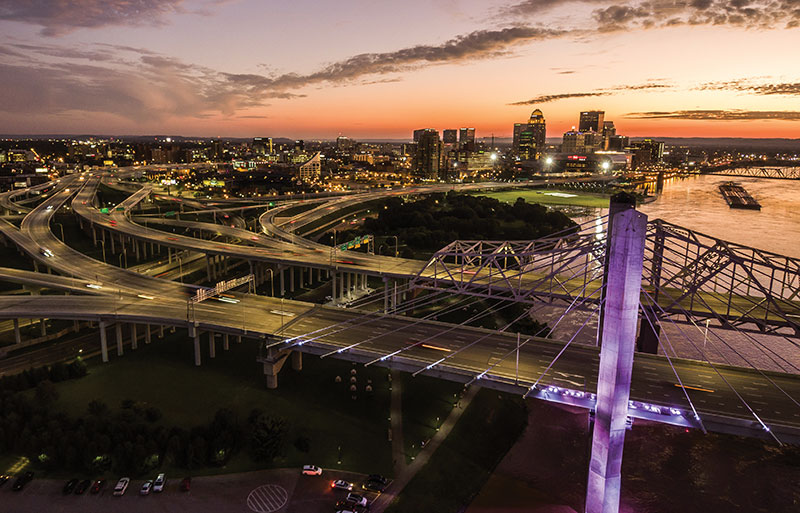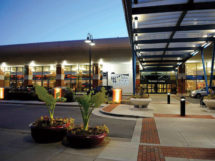LOGISTICS & TRANSPORTATION
By Robert Hadley

“Kentucky is a pro-business powerhouse,” proclaims the commonwealth’s Cabinet for Economic Development, and one has only to look to the logistics infrastructure to justify the claim.
This is particularly true of the Greater Louisville region. The city accesses three major interstates (I-64, I-65 and I-71), three working ports on the Ohio River and the Muhammad Ali International Airport, which also is home to UPS’s 5.2 million-s.f. Worldport, the largest automated package handling facility in the world. More than 300 UPS flights arrive and depart daily, and the hub processes about 2 million packages a day – 4 million during the peak holiday shipping season.
 The city even utilizes a rail system to support the manufacturing and pharmaceutical industries, said Sarah Davasher-Wisdom, president of Greater Louisville Inc. The city’s location has long been an economic advantage since the days of cargo shipments via the adjacent Ohio River.
The city even utilizes a rail system to support the manufacturing and pharmaceutical industries, said Sarah Davasher-Wisdom, president of Greater Louisville Inc. The city’s location has long been an economic advantage since the days of cargo shipments via the adjacent Ohio River.
“Logistics often comes down to location and Greater Louisville is located within a day’s drive of 70% of the U.S. population,” Davasher-Wisdom said. “We pride ourselves on the ability to move products, people and prosperity forward.”
Louisville’s logistics sector is more than twice as dense as the U.S. average, and is projected to grow nearly 30% in the next 10 years. The region’s resources support two Ford plants: the Kentucky Truck Plant on Chamberlain Lane and its Louisville Assembly Plant on Fern Valley Road. These factories and dozens of other area manufacturers and suppliers rely on the city’s logistical resources to remain competitive.
“The logistics industry is key to our manufacturing sector, specifically to the I-65 corridor serving the automobile manufacturing industry and all of its suppliers from here to Bowling Green and into Tennessee,” Davasher-Wisdom said.
The Muhammad Ali International Airport ranks second nationally in terms of cargo shipments, and fourth worldwide, according to the Airports Council International. The airport handled 15 billion pounds of cargo in 2019, 6.5% more than the previous year.
“This is a monumental milestone for Louisville’s airport,” said Dan Mann, executive director of the Louisville Regional Airport Authority. “It is quite an achievement to be consistently ranked among the top 10 airports in the world for cargo, but now to be in the top five is just incredible. This speaks to our status as the home of UPS Worldport, their global air hub. We are so proud UPS chose Louisville decades ago – not only are they a great partner for the Airport Authority, but for our community as well.”
The University of Louisville’s J.B. Speed School of Engineering has operated its Logistics and Distribution Institute since 1998. Engineering professors Lihui Bai and Monica Gentili co-direct the center, which focuses on research to support the logistics industry. Some projects have included studies of warehouse efficiency, product storage, automated order picking and similar topics.
“Logistics is very important to the economy, especially with e-commerce on the rise,” Bai said.
Blend of protocol and ingenuity key to meeting pandemic challenges
The global pandemic has changed consumer habits; online grocery ordering, curbside pickup and fast-food delivery have become more mainstream – and logistics make that happen.
Gentili spoke to the challenges logistics firms can encounter when meeting the unique set of challenges posed by pandemic.
The pandemic and government-ordered shutdown presented a Catch-22 for logistics firms. Although some shuttered businesses could still rely on e-commerce and the shipping industry to continue meeting customer needs, these companies saw their workforces reduced to satisfy social distancing and other safety practices.
“On the one hand, they have workforce being reduced by alternating staff members to come in on Monday or Wednesday (to enforce social distancing),” Gentili explained. “So that may actually reduce their delivery capability. On the other hand, the belief is that e-commerce may have increased their volume.”
Mitigating the coronavirus pandemic brought a number of challenges to most U.S. industries, inescapable ones for the shipping and logistics sector. Whereas most companies shuttered on government order, some members of the shipping industry occupy a unique position.
“UPS has been designated by the governments around the world as a ‘critical infrastructure business,’” explained Jim Mayer, UPS public relations manager. “We have both a privilege and a responsibility to continue safely working and delivering during this challenging period.”
This distinction, however, turned out to be a two-edged sword. Although e-commerce increased the use of shipments, the government-mandated social distancing and other measures complicated the process of keeping warehouse workers safe.
“UPS has gone to great lengths to protect our employees, customers and the general public,” he said. “Those measures include social distancing, supplying masks, hand-washing, enhanced cleaning of facilities, vehicles, tracking and tracing, etc., well before the state required (them).”
Workers diagnosed with COVID-19 receive up to 10 days of paid sick leave. Also, for workers who have a household member diagnosed with COVID-19, quarantines are strictly enforced, he said.
An additional example of the costly but necessary steps to remain open during the pandemic includes ferrying workers from UPS’s large parking lot to the Worldport hub. Normally accomplished by shuttles, the company rented 30 school buses to increase capacity and accommodate social distancing protocol, Mayer said.
The rules and regulations involved in safely staying open can sometimes resemble an obstacle course.
“Early on, disinfecting cleaner just wasn’t available; there was a global shortage,” Mayer explained. “Our building and systems engineering team started making its own diluted bleach cleaner in 55-gallon batches to ensure we’d continue to have the ability to effectively clean and disinfect our facilities.”
Manufacturing sanitizer when none is available shows how the industry, in Davasher-Wisdom’s words, has “really pivoted and improved their already stellar processes.”
Bus, barge, rail give key global connections
Business travelers and residents in Louisville and beyond benefit from a robust public transportation system whose central element is the Transportation Authority of River City.
TARC provides more than 12.5 million passenger trips covering more than 12 million miles annually. The buses – with comfort and productivity amenities such as on-board Wi-Fi, luggage racks, reading lights and other features – run 43 routes in five counties across Kentucky and Southern Indiana. TARC vehicles average more than 41,000 riders daily, and 83% of trips are for work or school.
TARC helps commuters avoid parking fees and buying gas. However, residents of Louisville and Southern Indiana also benefit from easy options to hoof it or take two wheels, thanks to the Big Four Pedestrian Bridge that connects Louisville’s picturesque Waterfront Park with downtown Jeffersonville, Ind.
Greater Louisville and Southern Indiana have the benefit of top-notch water, rail and logistics infrastructure to make their resident businesses highly competitive.
The Louisville Riverport Authority has been a centerpiece of economic growth and development in Louisville for the past 30 years. Riverport is home to 120 companies that employ more than 6,500 people – businesses engaged primarily in manufacturing or logistics and distribution, including Honeywell Logistics, Balfour Co., Coca-Cola Consolidated, Atlas Machine & Supply, Interpolymer Corp., Kentucky Trailer and Zeon Chemicals. It has over 2,000 acres of land used for industrial and commercial development.
Riverport’s fully developed transportation facilities complement Louisville’s central location to make it one of the most accessible industrial parks in the nation. The port includes cargo dock, a barge fleeting area and ground storage. It has rail service by CSX, Norfolk Southern, and Paducah & Louisville.
The Port of Indiana-Jeffersonville is a part of America’s premier inland port system, the Ports of Indiana. Situated on two major North American freight transportation arteries – the Great Lakes and the Inland Waterway System – the state’s three-port system serves the world’s most productive industrial and agricultural regions.
More than 1,000 barges, 250,000 trucks and 16,000 railcars pass through the port each year, moving cargo to various states on the Inland Waterways System and to the world by transshipment with ocean vessels in the Gulf of Mexico.
The Port of Indiana-Jeffersonville is home to 27 companies, including 15-steel related businesses, the port’s maritime industrial park offers warehousing, distribution and manufacturing facilities, a variety of steel services including processing, roll forming and galvanizing, along with multimodal connections.
Louisville Regional Airport Authority
700 Administration Drive
Louisville, KY 40209
(502) 368-6524
FlyLouisville.com
Louisville Muhammad Ali International Airport (SDF) and Bowman Field (LOU) are part of the Louisville Regional Airport Authority (LRAA). The LRAA is an autonomous municipal corporation established by Kentucky state statute that is responsible for owning, operating and developing both airports.
In 2019, SDF was the 4th busiest cargo airport in the world and the 2nd busiest in North America. 2019 was also the airports busiest year of passenger traffic ever, with more than 4.2 million total passengers.
Six airlines serve SDF, offering flights to over 30 destinations. With one stop, travelers can reach more than 460 destinations.
Verst Logistics
300 Shorland Drive
Walton, KY 41094
(800) 978-9307
verstlogistics.com
Verst is an Inbound Logistics Magazine Top 100 asset-based 3PL providing transportation, warehousing, e-commerce fulfillment and packaging solutions for clients throughout the U.S. For over 50 years we have provided resources that help extend the expertise and capability of our customers.
AIRPORTS & GENERAL AVIATION
Atlantic Aviation
Louisville Muhammad Ali International Airport
atlanticaviation.com
Bowman Field
Louisville
flyLouisville.com
Clark Regional Airport
Sellersburg, Ind.
flyjvy.com
Lebanon-Springfield Airport
Springfield, Ky.
lebanonspringfieldairport.net
Louisville Muhammad Ali International Airport
flylouisville.com
INTERNATIONAL SHIPPING COMPANIES
DHL
dhl.com
FedEx International
fedex.com
UPS
ups.com
PUBLIC RIVERPORTS & RAIL
Canadian Pacific Railway
cpr.ca
CSX
csx.com
Louisville Riverport Authority
louisvilleriverportauthority.com
Norfolk Southern
nscorp.com
Port of Indiana-Jeffersonville
Portsofindiana.com
Meade County Riverport
meadeky.com/riverport-authority




















Add Comment